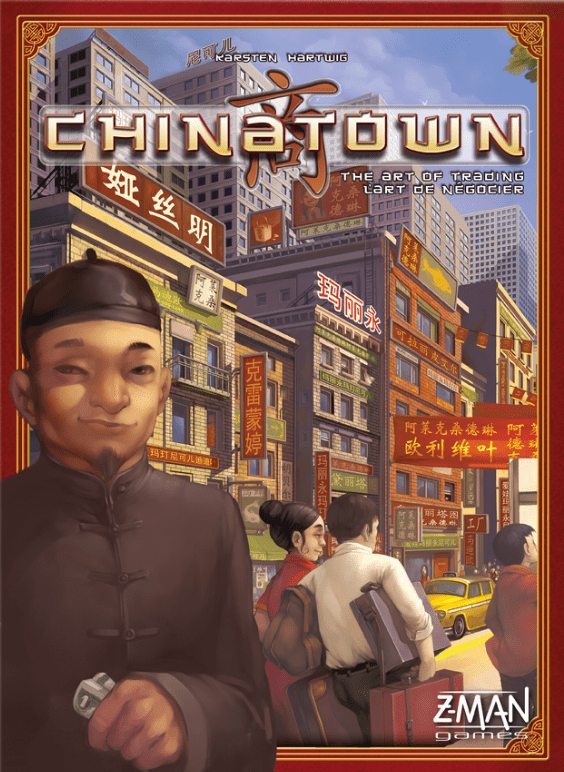How To Play: Chinatown
Chinatown is all about mastering negotiation, property trading, and strategic tile placement. You win by knowing the market, making smart trades, and placing tiles wisely. It's key to stay flexible, understand your opponents, and always look out for beneficial deals. Conquer Chinatown with adaptability and sharp bargaining skills.

Hey, game lovers! Ever dived into the bustling streets of Chinatown? This game is all about strategy, trading, and building your own business empire. In this post, I’m breaking down not just the game rules but also the best strategies to crush your opponents and emerge as the Chinatown champion. Whether you’re new to the game or looking to step up your play, this guide’s got you covered.
Overview
What’s in the box
- 1 game board
- 150 building tiles
- 90 business tiles
- 1 year marker
- 5 player markers
- 100 money cards
- 80 ownership markers (16 in each of the 5 player colors)
- 1 rule book
How To Play Chinatown: Rules Summary
Chinatown is a thrilling board game that takes you into the heart of New York’s bustling Chinatown district. The goal? To become the wealthiest mogul by smartly trading properties, building businesses, and earning the most money by the end of the game. Here’s how you can jump right into the action:
Setup
- Place the game board in the center of the table.
- Each player picks a color and takes the corresponding markers and starting money.
- Distribute property cards to players to determine initial ownerships.
- Shuffle the business tiles and set them within reach of all players.
Gameplay
- Each round starts with dealing new property cards and drawing business tiles.
- Players enter the negotiation phase, where anything from properties to cash can be traded. Be sharp and strategic!
- After trading, players build businesses on their properties.
- Once all players have acted, income is calculated based on completed businesses.
- The game progresses through 6 rounds of intense negotiations and building.
Winning
- The game ends after 6 rounds.
- Players calculate their total wealth, combining cash in hand and the value of their businesses.
- The player with the highest total wealth is the winner.
Special Rules & Conditions
- No piece of land can host more than one business.
- Players can only build a business if they own at least two adjacent properties.
- Any deals made during the negotiation phase must be honored, so think before you agree.
So there you have it! Grab your friends, set up the game, and start wheeling and dealing in the competitive world of Chinatown. Remember, the best negotiator often comes out on top. Good luck!
Best Chinatown Strategies
Mastering the Art of Deal-Making in Chinatown
Winning at Chinatown isn’t just about luck; it’s about sharp negotiation skills. Here’s how to get ahead:
Understand Your Opponents
- Pay attention to their needs and leverage this in talks.
- Remember, everyone’s aiming to win, but helping others can help you, too.
Value Your Assets Properly
- Know the worth of your tiles and shops. Don’t undersell.
- Use this knowledge to make fair, but favorable deals.
Be Flexible but Firm
- Stay open to offers, but don’t give away your strategy.
- Learn when to hold back and when to seal the deal.
These skills don’t just make the game more fun; they’re your ticket to winning. So, next time you sit down to play, remember these tips and watch as you become the master of negotiation.
Master the Art of Property Trading in Chinatown
Know Your Market
Always start by scoping out which properties are hot. It’s not just about what you want; it’s about what everyone wants. This makes your trades more valuable.
Timing is Everything
Don’t rush. Wait for the right moment to make offers. Sometimes, letting others reveal their strategies first can give you the upper hand in negotiations.
Bundle Deals
Group your properties into attractive packages. Offering a bundle that helps someone else complete a set can secure you a better trade.
The Ultimate Tile Placement Strategy for Dominating Chinatown
To win Chinatown, layer your strategy with smart tile placement. It’s all about positioning for maximum profit.
Maximize Your Real Estate
- Start by securing spots near the board’s center. They’re goldmines for foot traffic.
- Focus on clustering your businesses closely to complete them faster.
Adapt and Overcome
- Don’t stick to one plan. Be ready to pivot based on the tiles you draw.
- Trade tiles smartly, sometimes sacrificing a bit for a better strategic position.
Watch and Learn
- Keep an eye on opponents’ moves. Block their biggest plays when you can.
- Anticipate the tiles they need and use this knowledge to your advantage in trades.
## Winning Chinatown: The Final Move
Wrapping up, remember that Chinatown is not just about what’s on the board but also about what’s happening around it. From our nights filled with laughter, tense negotiations, and the occasional ‘I can’t believe you just did that’ moment, the key takeaway is simple: stay sharp, stay flexible. Keep an eye on the big picture, adapt your strategy as the game unfolds, and most importantly, never underestimate the power of a good deal. Whether you’re a seasoned negotiator or a first-time player, the streets of Chinatown are waiting for you to claim your fortune. So gather your friends, put these strategies to the test, and let the best negotiator win!
Want to know what we think of Chinatown? Read our detailed review of Chinatown here

